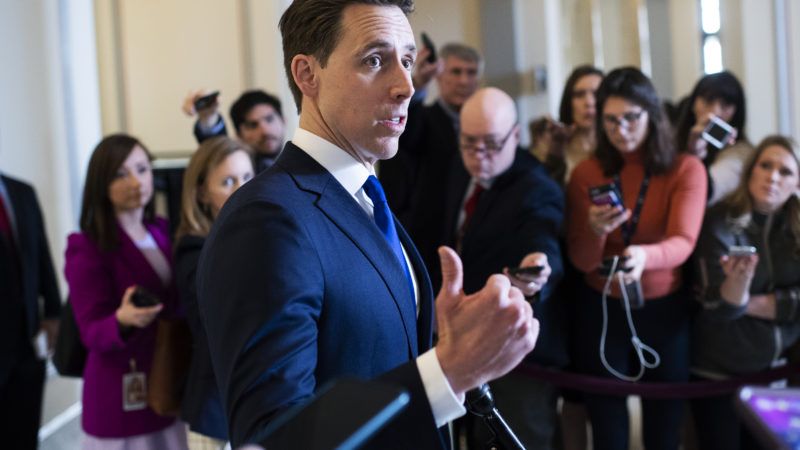United Airlines Received $5 Billion From Taxpayers to Protect Employees' Paychecks. Now It's Cutting Hours for 15,000 Workers.
Lawmakers who voted for the $50 billion bailout of the airline industry are just shocked at these companies' behavior.

Passenger airlines received billions in federal grants to keep their employees paid in the midst of a near-total collapse in demand for air travel during the coronavirus pandemic. Some companies are nevertheless finding creative ways to cut employees' pay while still receiving government aid.
On Friday, news broke that United Airlines would be cutting 15,000 airport staff and baggage handlers' hours from 40 to 30 a week, converting them from full- to part-time status. The announcement came after a grim earnings report showing the company had suffered a net loss of $1.7 billion in the first quarter of this year.
United has also received $5 billion from the U.S. Treasury through the Coronavirus Aid, Relief, and Economic Security (CARES) Act's Payroll Support Program, including a $3.5 billion grant and another $1.5 billion loan. The company has also applied for another federal loan made possible by the CARES Act.
This follows similar actions by both Delta and JetBlue, who have both reduced employee hours in April to cut costs. Delta has received $5.3 billion from the CARES Act's Payroll Support Program. JetBlue received $935 million.
The CARES Act overall included $50 billion in support, split evenly between loans and grants, for passenger airlines. A condition of accepting this federal support—and indeed the stated purpose of this support—was that the airlines retain staff at the same pay rates.
The quickly passed law, however, does not specify anything about minimum hours or income, allowing airlines to cut hours while still ostensibly complying with the letter of the law.
In an email sent to the company obtained by The Daily Beast, United's Executive Vice President Greg Hart said that despite billions in federal support, his airline was still in the red.
"Even with a federal government grant that covers a portion of our payroll expense through Sept 30, we anticipate spending billions of dollars more than we take in for the next several months," wrote Hart. "That's not sustainable for any company and that's why we are making difficult decisions across our entire business."
Meanwhile, some union representatives and members of Congress are shocked that the legislation they supported would be used to bail out companies instead of supporting workers.
"Hundreds of thousands of [International Association of Machinists] members in every sector of our union proudly called elected officials and demanded action to protect the industries in which we work," wrote union officials Michael Klemm and David Supplee in an April letter to JetBlue and Delta. "Now, opportunist corporate actors such as yourselves are using that good faith support of airline workers around the country and at every carrier to screw your own workforces and greedily undermine the intent of the federal stimulus funds that you demanded."
On Friday, Klemm released a statement saying United's actions probably violated the CARES Act. (They did not.) He wrote that his union was considering legal action.
Rep. Sheila Jackson Lee (D–Texas) said, "It was not the intent of Congress for this program to be used as an economic bail-out" in a letter to Klemm, according to The Daily Beast, but rather to support its workers.
Sen. Josh Hawley (R–Mo.) has called on United to return the CARES Act money it received after learning that the bill he voted for allowed their employers to cut hours.
I'm at the airport, flying back to DC, and multiple @United employees have told me the company is cutting their hours, pay & benefits immediately. This is AFTER United took billions in bailout money that was earmarked for workers. This has better not be true
— Josh Hawley (@HawleyMO) May 1, 2020
Perhaps Jackson Lee and Hawley should have considered the possibility that airlines accepting government aid would cut employee hours. They could have offered amendments to prevent that or voted against the legislation entirely.
They didn't, and airlines are now taking advantage of a loophole in the law. Both lawmakers and airline companies are culpable.
The cuts initiated by United are also a good example of the contradictory conditions placed on airline bailout funds. These companies were required to not furlough staff during a time of near-zero demand for air travel. At the same time, the CARES Act also requires these airlines to keep performing a minimum number of flights to destinations they served prior to March 1, 2020. The Department of Transportation is responsible for setting these minimum service requirements.
The result has been airlines burning fuel and cash putting nearly empty planes in the air just so they can access federal support.
At some point, something has to give.
One justification offered for bailing out airlines and other industries is that these businesses are losing money through no fault of their own. They didn't cause the COVID-19 outbreak, and shouldn't be punished for it.
Even if the unprecedented circumstances experienced by the airline industry make it more deserving of support, we're still left with the same flawed federal government providing that support. And once again, the federal government has proven it's not up to the task of centrally planning whole industries.
Rent Free is a weekly newsletter from Christian Britschgi on urbanism and the fight for less regulation, more housing, more property rights, and more freedom in America's cities.


Show Comments (65)